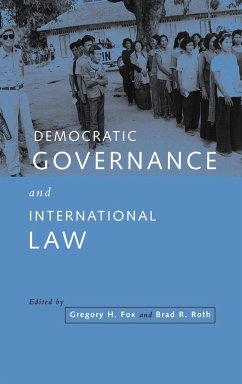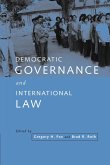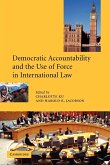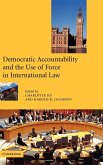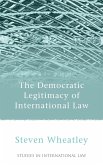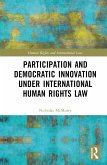Prior to the end of the Cold War, the word 'democracy' was rarely used by international lawyers. Few international organisations supported democratic governance, and the criteria for recognition of governments took little account of whether regimes enjoyed a popular mandate. But the events of 1989-1991 profoundly shook old assumptions. Democratic Governance and International Law attempts to assess international law's new-found interest in fostering transitions to democracy. Is an entitlement to democratic government now emerging in international law? If so, what are its normative foundations? How have global and regional organisations encouraged transitions to democracy, and are their efforts consistent with their constitutional frameworks? How should international law react to elections in which profoundly anti-democratic parties win the vote? In this volume, leading legal scholars grapple with these and other questions to assess the future of international law on this most domestic of questions.
Table of contents:
Introduction: The spread of liberal democracy and its implication for international law Gregory H. Fox and Brad R. Roth; Part I. The Normative Foundations of a Right to Political Participation: 1. Legitimacy of the democratic entitlement Thomas M. Franck; 2. The right to political participation in international law Gregory H. Fox; 3. Democracy and the body of international law James Crawford; Part II. Democracy and Inter-State Relations: 4. Democratic legitimacy and the recognition of states and governments Sean D. Murphy; 5. Constitutionalism and democratic government in the inter-American system Steven Schnably; 6. Government networks: the heart of the liberal democratic order Anne-Marie Slaughter; Part III. Democracy and the Use of Force: 7. Sovereignty and human rights in contemporary international law W. Michael Reisman; 8. 'You, the people': pro-democratic intervention in international law Michael Byers and Simon Chesterman; 9. Pro-democratic intervention by invitation David Wippman; 10. The illegality of 'pro-democratic' invasion pacts Brad R. Roth; 11. International law and the 'liberal peace' John Owen; Part IV. Democratisation and Conflicting Imperatives: 12. Intolerant democracies Gregory H. Fox and Georg Nolte; 13. Whose intolerance, which democracy? Martti Koskenniemi; 14. Democratic intolerance: observations on Fox and Nolte Brad R. Roth; 15. A defence of the 'intolerant democracies' thesis Gregory H. Fox and Georg Nolte; 16. Democracy and accountability: the criss-crossing paths of two emerging norms Steven R. Ratner; Part V. Critical Approaches: 17. Evaluating democratic progress Brad R. Roth; 18. What kind of democracy does the 'democratic entitlement' entail? Jan Knippers Black; 19. International law, democracy and the end of history Susan Marks.
Traditionally, international law said little about how governments were chosen. However, in the 1990s, international law has been deployed to encourage transitions to democracy. In this volume, leading international legal scholars assess this change, asking whether commitment to democracy is consistent with the structure of the international legal system.
This book considers how the post-Cold War democratic revolution has affected international law.
Table of contents:
Introduction: The spread of liberal democracy and its implication for international law Gregory H. Fox and Brad R. Roth; Part I. The Normative Foundations of a Right to Political Participation: 1. Legitimacy of the democratic entitlement Thomas M. Franck; 2. The right to political participation in international law Gregory H. Fox; 3. Democracy and the body of international law James Crawford; Part II. Democracy and Inter-State Relations: 4. Democratic legitimacy and the recognition of states and governments Sean D. Murphy; 5. Constitutionalism and democratic government in the inter-American system Steven Schnably; 6. Government networks: the heart of the liberal democratic order Anne-Marie Slaughter; Part III. Democracy and the Use of Force: 7. Sovereignty and human rights in contemporary international law W. Michael Reisman; 8. 'You, the people': pro-democratic intervention in international law Michael Byers and Simon Chesterman; 9. Pro-democratic intervention by invitation David Wippman; 10. The illegality of 'pro-democratic' invasion pacts Brad R. Roth; 11. International law and the 'liberal peace' John Owen; Part IV. Democratisation and Conflicting Imperatives: 12. Intolerant democracies Gregory H. Fox and Georg Nolte; 13. Whose intolerance, which democracy? Martti Koskenniemi; 14. Democratic intolerance: observations on Fox and Nolte Brad R. Roth; 15. A defence of the 'intolerant democracies' thesis Gregory H. Fox and Georg Nolte; 16. Democracy and accountability: the criss-crossing paths of two emerging norms Steven R. Ratner; Part V. Critical Approaches: 17. Evaluating democratic progress Brad R. Roth; 18. What kind of democracy does the 'democratic entitlement' entail? Jan Knippers Black; 19. International law, democracy and the end of history Susan Marks.
Traditionally, international law said little about how governments were chosen. However, in the 1990s, international law has been deployed to encourage transitions to democracy. In this volume, leading international legal scholars assess this change, asking whether commitment to democracy is consistent with the structure of the international legal system.
This book considers how the post-Cold War democratic revolution has affected international law.

